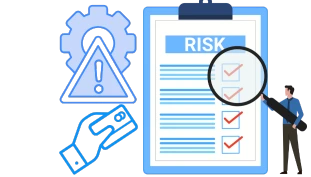Securing a merchant account with bad credit can be challenging, but it’s not impossible. If your credit history is holding you back, consider applying for a bad credit merchant account. When a merchant services provider views your business as high-risk due to a poor credit score, they may impose higher processing fees or, in some cases, refuse to offer you payment processing services altogether. However, there are still options available for opening a merchant account, even without perfect credit. Here’s what you need to know!
How to Get a Merchant Account with Bad Credit
Obtaining a merchant account with bad credit requires multiple steps. However, it’s similar to applying for a merchant account with good credit. The standard process for acquiring a merchant account is as follows:
- Choose a business structure for your new enterprise.
- Apply for the necessary business licenses.
- Open a traditional business bank account.
- Choose the payment methods you’d like to accept.
- Develop and advertise your terms of service and refund policies.
- Ensure all PCI compliance regulations are met.
- Collect documents stating your business’s age, size, and processing volume.
- Apply online for a merchant account.
- Gather six months of bank statements and processing statements.
- Before committing to a provider, assess the processing fees to receive the most affordable rates for your business.
For bad credit merchant accounts, underwriting may require additional financial details, such as a Personal Statement of Affairs (PSOA) document listing your business’s assets and liabilities. A PSOA helps outside parties better understand your company’s current financial position.
What Is a Bad Credit Merchant Account?
When a business accepts payments, the transaction funds are held in its merchant account until settlement, at which point they are released into the merchant’s business bank account. Without a merchant account, you cannot accept credit or debit card payments for your goods or services. A bad credit merchant account enables businesses to process credit card payments regardless of their credit history.

How to know if you need merchant services for bad credit
If your business has not applied for a merchant account, you need to determine if payment processors will consider you a high-risk merchant. Start by checking your personal and business credit score. This can help you determine if you need a merchant account that supports people with bad credit. According to Experian, a bad business credit file includes:[1]Experian. “How to Fix a Bad Credit Score.” March, 20, 2025
- Prior Bankruptcy: Many providers avoid businesses with a history of bankruptcy.
- Outstanding Liens: If lenders have outstanding liens on your assets, your business cannot use the assets as collateral.
- Unresolved Debt: Unpaid debt results in providers considering your business a higher risk for a merchant account.
- Inconsistent Income: Payment processors assess income to determine the financial health of the business.
Other factors can also lead to merchant services providers categorizing your business as “high risk.” For example, your business might face difficulty acquiring a merchant account if it operates in a high-risk industry, such as dropshipping, cannabis, or other industries with uncertain regulations. This remains true even if your business has a good credit score and consistent income. If this is the case, you may want to consider getting a high-risk merchant account.
Why Having Poor Credit Is Considered High Risk

Businesses in the payment processing industry aim to partner with parties offering minimal risks. Because payment processors may lose money in the event of fraud or negligence within their partners’ operations, they avoid partnering with parties presenting a risk.
Poor credit history is considered high risk because it indicates negligent business management. If a business doesn’t have a strong credit history, it may benefit from searching for merchant services providers with experience servicing high-risk businesses. Experienced providers are more familiar with the stringent underwriting processes for bad credit merchant accounts, which may require additional financial information, cosigners, reserves, and various other assurances.

Prone to chargebacks
A chargeback occurs when a customer contacts their credit card issuer to lodge a payment dispute. If a chargeback is successful, the merchant must refund the money to the customer. A successful chargeback is recorded as a strike against the business’s merchant account.
Chargeback fees are expensive for both merchants and payment processors. In some cases, processors can face significant fines from credit card issuers due to their merchant partnerships incurring excessive chargeback ratios.
While many payment processors partner with high-risk merchants, you can still lose your merchant account if your chargeback ratio exceeds specified limits. For example, payment processors consider a chargeback ratio above 1% to be high risk, but it is still acceptable. However, you may find it impossible to find a provider willing to work with your business if your chargeback ratio exceeds 2%.
Bad Credit Merchant Account Application Requirements
As previously mentioned, bad credit merchant account applications follow a similar structure to that of traditional merchant account applications. The primary difference lies in the documentation required. When applying for a bad credit merchant account, below are some additional resources that may be requested:
- Bank Statements (3-6 months): Additional bank statements of up to six months showcase your business’s financial position and its ability to generate consistent revenue.
- Processing Statements: Processing statements outline payment processing history and reveal your existing chargeback ratio. Not all businesses, especially newer businesses, will have these documents.
- Additional Information: If your business has bad credit, you should expect more general questions during the underwriting process. While merchant account providers do have an interest in providing you with payment processing services, they must protect their bottom line.
What to Look for When Researching Bad Credit Merchant Account Providers
It’s important to partner with reputable merchant services providers, especially when obtaining a bad credit merchant account. Higher-risk merchant accounts face an increased likelihood of closure, and terminated merchant accounts will show up on your business file when you apply to merchant services providers in the future. Experienced providers can ensure proper due diligence is performed and necessary security measures are put in place—both of which decrease the likelihood of account termination for high-risk merchants.
Here’s what merchants should look for when searching for a bad credit merchant account provider:

Make sure they partner with high-risk merchants
If a provider doesn’t work with high-risk merchants, there’s no point wasting your time with an application. Fortunately, many merchant service providers offer tailor-made services to high-risk merchants.

Check for transparent pricing
Identifying fees for processing payments, chargebacks, CNP transactions, and more should be easy. However, this is not always the case. Hidden fees and exorbitant processing rates can be a nightmare for any business, especially if they’ve signed a contract. That said, only partner with a provider offering transparent credit card processing fees.

Inquire about reserves, volume restrictions, and other limitations
Payment processors may impose limitations on merchant accounts issued to businesses with low credit scores. One of the most common limitations is a volume restriction, meaning your business won’t have access to unlimited payment processing. Secondly, a payment processor may require a reserve amount of funds as a deposit. Clarify any restrictions before you make commitments, as they can drastically impact your business’s ability to operate.

Consider contractual obligations
Review the contractual obligations required by each merchant account provider you’re considering. There are many details to a financial contract; look at the length of time you’ll be partnered, termination fees, and more.
Do No Credit Check Merchant Accounts Exist?
Payment processors need to understand your risk profile to properly conduct due diligence. In order to create your risk assessment, processors must assess your credit file. So, yes, you must undergo a credit inquiry to obtain a traditional merchant account.
However, payment service providers, such as PayPal, Square, and Stripe, often forgo a credit inquiry before allowing you to begin processing credit card payments. While these service providers present themselves as a viable alternative to traditional merchant accounts, they are not high-risk friendly and come with other challenges, including payment freezes, low volume restrictions, high processing rates, account terminations, and a host of other issues.
How Quickly Can You Get a Bad Credit Merchant Account?

Whether you’re starting a new business or searching for a merchant account for an existing business, the application process can feel overwhelming.
Accurate underwriting is essential to properly secure a merchant account. Bank statements, business documents, processing history, and other relevant documentation take time to process. As such, it typically takes a few days to approve a merchant account application.
While providers may offer expedited approval, avoid any provider offering immediate approval for a merchant account. If the underwriting process is not appropriately executed, there’s a higher likelihood of account termination. Businesses with a history of terminated merchant accounts have a more difficult time securing future merchant accounts. By cutting corners to secure your account faster, you could make it harder to open a suitable account in the future.
What to Expect with Bad Credit Merchant Services
If you or your business have a bad credit score, providers may require you to adhere to the following stipulations:
- Higher Fees: If a merchant account provider believes you are at risk of a higher chargeback ratio or other negative issues, they may charge higher fees to counter the financial exposure associated with servicing you.
- Reserves: Payment processors may require reserves from merchants with poor credit scores. In this event, the bank hosting your merchant account retains a certain amount from your deposits as a safety net for potential chargebacks. The funds are still yours and can be requested if your account is in good standing after some time.
- Lower Volume Restrictions: Merchant services providers have the right to restrict the amount you process each month. If you establish a strong payment processing history over the following months, the volume limit may be increased or lifted.
- Long-Term Contracts: Bad credit merchant services providers may attempt to lock your business into a long-term contract. Merchant services providers want to guarantee your business for a prolonged period before they make concessions for your poor credit score.
Poor Credit Merchant Account: Final Thoughts
Obtaining a merchant account can be challenging for merchants with unfavorable credit. However, plenty of providers are willing to partner with high-risk merchants and offer the most competitive rates. High-risk merchant service providers specialize in servicing high-risk industries and merchants, so you’ll never be in the dark about how to successfully move your company forward. With the right provider on your side, you can gain the most cutting-edge payment processing available (bad credit scores and all).
FAQs About Merchant Accounts for Bad Credit
Do processors check your credit when applying for a merchant account?
Yes, payment processors check your credit as part of due diligence when assessing merchant account applications. Maintaining a strong credit file will help improve your business’s chances of obtaining a merchant account with the most affordable rates.
What credit score is needed for a merchant account?
The lowest credit score a merchant services provider will likely work with is around 550-600. Anything below that may require a cosigner, and you must accept any number of the stipulations listed above.
Why does my credit history matter when applying for merchant services?
Credit history provides an overview of an individual or business’s risk. Businesses with unfavorable credit events, such as unpaid bills, high revolving utilization, court filings, and other negative issues, can expose processors to extensive risk.
For example, a business with a history of negative credit events is more likely to experience a high number of chargebacks. If a merchant account provider partners with a business experiencing excessive chargebacks, the provider can face thousands of dollars worth of fines from credit card issuers. Chargeback-prone clients are simply too expensive for many providers to justify.
How can I improve my credit score to increase my chances of approval?
Improving your personal and business credit score increases your chances of obtaining a merchant account, avoiding high transaction fees, and circumventing other payment restrictions.







